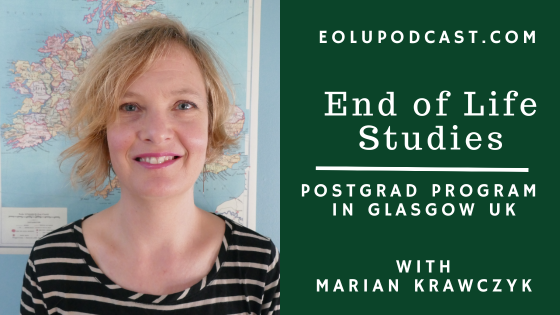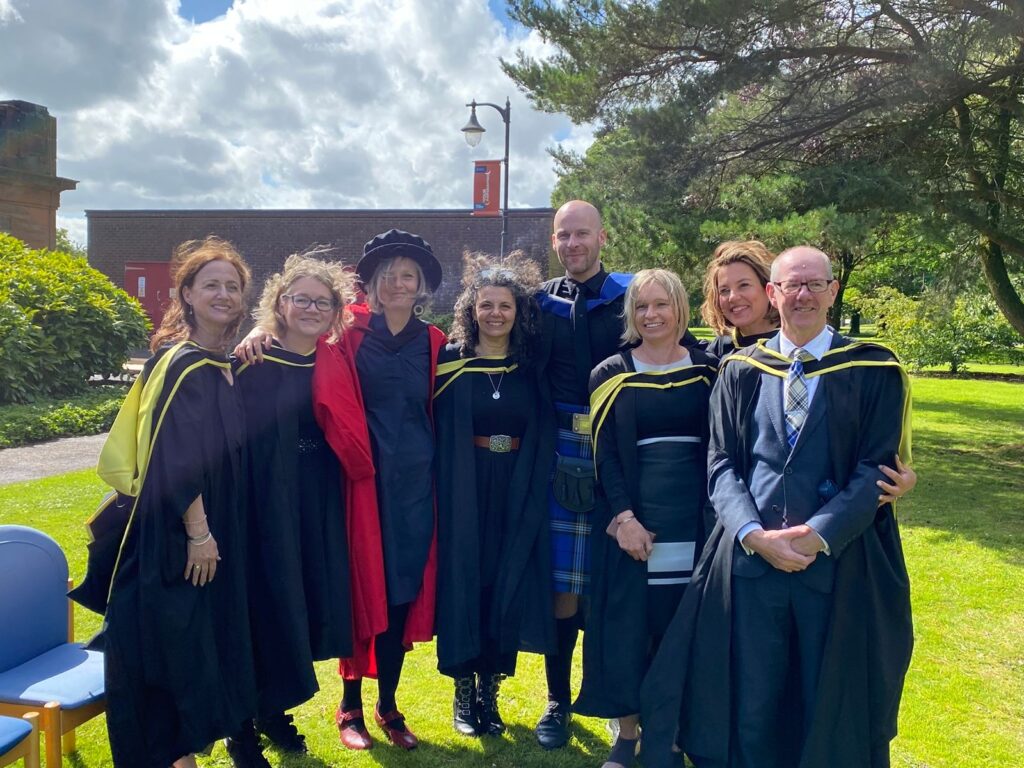Recently, I had the privilege of being interviewed by Dr Karen Wyatt on the End of Life University podcast. Our conversation delved into the unique aspects of the End of Life Studies programme here at the University of Glasgow in Scotland, as well as the broader implications for end-of-life care and education worldwide. This year is particularly significant for us in Glasgow, as we celebrated our first graduating class—and a milestone that provided the touchstone for my discussion with Dr Wyatt.
Listen here: https://shorturl.at/t490c
About the End of Life Studies Programme
Launched in January 2021, our programme is a fully online postgraduate course designed to offer new, critical, and interdisciplinary perspectives on end-of-life practice. We structured the programme flexibly to accommodate a diverse range of students. This means that someone can take individual courses for personal enrichment or professional development, earn a postgraduate certificate by completing three courses, obtain a diploma by completing six courses, or achieve a Master of Science degree by completing six courses plus a dissertation.
We strive to make the programme accessible to as many people as possible. While a bachelor’s degree is generally required, we have a non-traditional entry pathway for those with substantial experience in the field but without formal academic qualifications. This inclusivity reflects our commitment to bringing together – in the words of Dame Cicely Saunders – a “community of the unalike,” fostering a rich learning environment where diverse perspectives converge. With our first cohort having graduated this year, it been inspiring to see how our approach has resonated with students worldwide.
Student Achievements and Impact
One of the most rewarding aspects of the programme is our international student body, with learners from over 20 countries, including Canada, China, Mexico, the Netherlands, Portugal, South Africa, Singapore, South Korea, and the United Kingdom and the United States, as well as various other regions across the globe. This diversity enriches our discussions and broadens perspectives, as students share experiences from various cultural and professional backgrounds. I have been particularly proud to see how these international connections have fostered a vibrant and supportive community. Based on the bonds they developed through the programme, many of them expended considerable effort to gather in Scotland to graduate together.
Over the coming months, Dr Wyatt will be showcasing some of our student’s innovative research in more detail on her podcast. Make sure to subscribe or check back with her podcast over the next few months as those interviews become available.
In my conversation with Dr Wyatt I was very pleased to be able to share some success stories of our first graduating class who have undertaken a diverse array of impactful projects that reflect their varied professional backgrounds and personal interests across various countries. For example, in the UK, palliative care nurses examined companionship schemes for dying patients and studied how internationally recruited nurses’ attitudes affect analgesia administration; a South African student focused on palliative care for rural Black South Africans, highlighting cultural and accessibility challenges; a Canadian end-of-life doula conducted pioneering research on families’ experiences with doulas during end-of-life care; and a Scottish funeral celebrant studied the rise of celebrants and their impact on contemporary funerals. Other projects also included explorations of social death in hospitals, the experiences of families of individuals who opt for medical assistance in dying, the potential of virtual reality to minimize death anxiety, attitudes toward death education in primary schools, the digital experiences of the very old, and cultural perspectives on advance care planning in Mexico City.
Collectively, these projects highlight the programme’s commitment to addressing a wide range of end-of-life issues across different cultures, professions, and societal contexts. Seeing our first graduates apply their learning practically to address real-world challenges has been incredibly fulfilling. Their achievements exemplify the programme’s goal of equipping people to make meaningful contributions in the field of end-of-life care. Over the coming months, Dr Wyatt will be showcasing some of these student’s innovative research in more detail on her podcast. Make sure to subscribe or check back with her podcast over the next few months as those interviews become available.
Looking Ahead: Shaping the Future of End-of-Life Care
During the interview I was asked about the emerging trends that will shape dying, death, and bereavement in the 21st century. This led to a discussion about the importance of internationalization, understanding end-of-life care in a global context, especially for refugees and displaced populations. We highlighted social justice issues, addressing disparities in access to quality end-of-life care for marginalized groups. I mentioned the growing desire for personalization and autonomy, supporting individuals’ wishes for control over their dying process and after-death care. We also explored the need to balance professional and community approaches, integrating medical expertise with community-led initiatives like end-of-life doulas and compassionate communities. I also touched on how the impact of climate change on end-of-life care is a significant concern, and how grief models can help navigate ecological loss. Finally we discussed how technological advances, such as the role of artificial intelligence in palliative care and end-of-life planning, are further transforming the field.
An Invitation to Join
With our first graduates now making an impact in various sectors, it’s an exciting time to join the conversation. We value collective ideas and community engagement, and we invite prospective students to become part of this global dialogue. Whether you’re a healthcare professional, an academic, a community practitioner, or simply someone passionate about end-of-life issues, our programme offers a unique opportunity to contribute to a field that is universally relevant.
For anyone interested in learning more about the programme or how to apply, please feel free to visit our website or contact me directly at Marian.Krawczyk@glasgow.ac.uk. I look forward to welcoming new members into our community, and all of us at the University of Glasgow congratulate our graduates on engaging in such important work!



